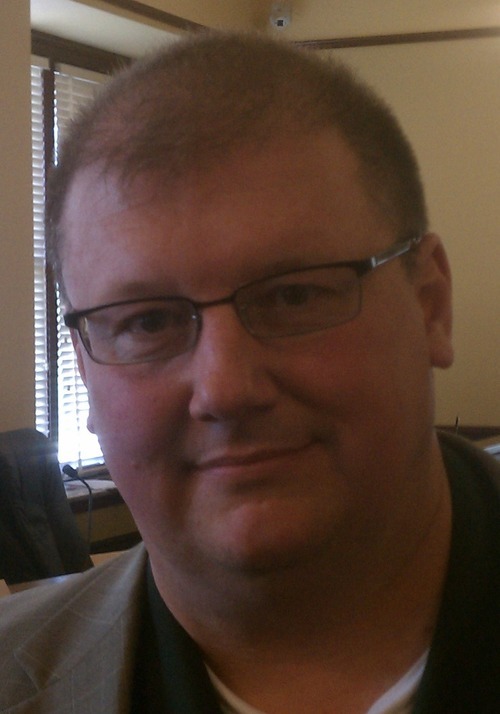This is an archived article that was published on sltrib.com in 2012, and information in the article may be outdated. It is provided only for personal research purposes and may not be reprinted.
Everyone driving on Interstate 15 in southwest Utah may soon have their license plate scanned by the U.S. Drug Enforcement Administration.
The DEA and two sheriffs are asking permission to install stationary license plate scanners on the freeway in Beaver and Washington counties. The primary purpose would be to catch or build cases against drug traffickers, but at a Utah Legislature committee meeting Wednesday, the sheriffs and a DEA representative described how the scanners also could be used to catch kidnappers and violent criminals.
That, however, wasn't the concern of skeptical legislators on the Law Enforcement and Criminal Justice Interim Committee. They were worried about the DEA storing the data for two years and who would be able to access it.
"It's not against the law to drive down I-15 from Utah to Nevada to gamble," said Utah Senate President Michael Waddoups, "but there are a lot of Utahns that would be pretty embarrassed by that."
Committee members asked for more information about the scanners and the data storage and agreed to discuss the issue at its June meeting.
Beaver County Sheriff Cameron Noel and Washington County Sheriff Cory Pulsipher testified in favor of the scanners — which operate much like those used in the check-out lane at grocery stores — and said they need legislative approval to put the devices on the freeway and on poles and electrical lines belonging to the Utah Department of Transportation.
One scanner would capture the license plates of vehicles traveling south on I-15 somewhere in Beaver County and the other scanner would catch northbound plates in Washington County.
Gary Newcomb, a supervisory IT specialist from the DEA, flew in from Virginia to testify Wednesday. He said the scanners are already in place on drug trafficking corridors in California and Texas, and the DEA is considering placing them on interstates near the Arizona cities of Kingman and Flagstaff.
The scanners would capture only the license plate, the GPS coordinates and the direction of travel, Newcomb said. If the DEA or another law enforcement agency has input a license plate number for a car to be stopped immediately, local police would be notified by email or a cell phone text message when that plate crossed the scanner.
For long-term investigations, including those tracking people who grow marijuana on public land in Utah, the digital data would be routed through the police dispatch centers in Beaver and Washington counties to a DEA facility in northern Virginia where it would be stored for two years.
The stored data could be used only to research the movements of suspected drug traffickers or to help other law enforcement agencies investigating serious crimes, Newcomb said. The DEA would track who is accessing the data and why, he said.
The stored data would not be cross-referenced with other databases such as those with names, drivers license or car make and model information, Newcomb said.
"I can assure you there is no private information stored in association with these plates," Newcomb told lawmakers.
The sheriffs also would have direct access to the data. Noel said the scanners could be programed to look for someone suspected of kidnapping a child. He also said he would use it to investigate people suspected of violent crime.
Noel admitted he would be "tempted" to use the scanner data to investigate felony property crimes but would resist. Noel, whose father is Rep. Mike Noel, R-Kanab, said he has no interest in using the scanners to locate people with outstanding traffic tickets and misdemeanor warrants, as many local police agencies do with their scanners.
Besides local police departments in Utah already having scanners fixed to patrol cars, Noel pointed out UDOT has video cameras on roads and freeways across Utah.
"I can have a deputy sit out there [on I-15] all day long and write down license plates and we still have to follow the exact same procedure" for investigating suspects, Noel said.
Legislators asked why the data had to be stored for two years when some police departments in Utah and elsewhere with license plate scanners fixed on patrol cars store the data for one year or only a few months. They also asked whether the sheriffs or the DEA would be forced to provide specific data if they received a subpoena in a civil court case. At least two legislators gave the scenario of a divorce case where a spouse files a subpoena for the data to track the movements of the other spouse.
Noel and Pulsipher said state law gives them authority to deny such subpoenas. Newcomb admitted he wasn't aware of any such prohibitions in federal law but said he has never received a such a request from a civil case.
Waddoups said he loves the idea of license plate scanners from a law enforcement standpoint.
"From the public relations aspect and the government intrusion into life, I hate this," Waddoups said.
As the committee was about to adjourn, chairman Rep. Curtis Oda of Clearfield, seemed to summarize legislators' skepticism.
"I'll be quite frank with you," Oda told Newcomb. "A lot of us in Utah don't trust the federal government."
Twitter: @natecarlisle



